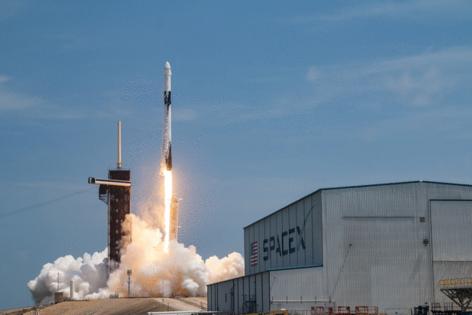FAA gives SpaceX the OK to launch just 1 Falcon 9 on asteroid mission for Europe
Published in News & Features
The Federal Aviation Administration on Sunday announced it was approving just one SpaceX Falcon 9 mission, although SpaceX has submitted its mishap report into why the second stage from last week’s Crew-9 mission failed to hit its planned target on reentry.
The FAA is giving the OK for the launch of the European Space Agency’s Hera mission, a follow-up to NASA’s DART mission that impacted an asteroid in 2021 as part of a planetary defense test to see if a potential Earth collision could be avoided through human intervention.
“The FAA has determined that the absence of a second stage reentry for this mission adequately mitigates the primary risk to the public in the event of a reoccurrence of the mishap experienced with the Crew-9 mission,” reads a statement from the FAA.
That Falcon 9 is slated to lift off Monday from Cape Canaveral Space Force Station’s Space Launch Complex 40 during a window that runs from 10:47 a.m. to 11:27, according to the FAA operations plan advisory.
The ESA probe Hera will fly back to the same binary asteroid system visited by DART with Hera tasked to perform a post-impact survey of the DART target, the smaller Dimorphos asteroid that orbits the larger Didymos.
“Hera will turn the grand-scale experiment into a well-understood and repeatable planetary defense technique,” reads the ESA mission website. “Demonstrating new technologies from autonomous navigation around an asteroid to low gravity proximity operations, Hera will be humankind’s first probe to rendezvous with a binary asteroid system and Europe’s flagship planetary defender.”
SpaceX has yet to confirm the launch attempt.
“Safety will drive the timeline for the FAA to complete its review of SpaceX’s Crew-9 mishap investigation report and when the agency will authorize Falcon 9 to return to regular operations,” the FAA stated.
SpaceX announced it was halting Falcon 9 launches after the Crew-9 mishap, and the FAA later confirmed it had halted Falcon 9 launches until an investigation is completed and final report submitted by SpaceX and approved by the FAA.
While SpaceX leads the investigation, it is being observed by the FAA, the National Transportation Safety Board, NASA and U.S. Space Force.
The FAA stated SpaceX submitted its mishap investigation report and a request to return to flight on Oct. 4.
The report comes after the second stage from the Crew-9 launch from Cape Canaveral on Sept. 28 landed outside of the designated hazard area.
While no public injuries or public property damage was reported, the FAA required an investigation.
It marked the third time this year the FAA has grounded the Falcon 9, and the second time because of an issue with the rocket’s second stage.
SpaceX said in its social media post the second stage “was disposed in the ocean as planned, but experienced an off-nominal deorbit burn. As a result, the second stage safely landed in the ocean, but outside of the targeted area. We will resume launching after we better understand root cause.”
While the Hera mission is approved, it’s unclear if the Falcon 9 grounding applies also to the upcoming Falcon Heavy launch for NASA from Kennedy Space Center.
The Europa Clipper mission from KSC’s Launch Pad 39-A looks to send the massive probe to Jupiter’s icy moon Europa as early as Oct. 10., although the approaching Hurricane Milton is likely to delay any launch attempt as the tropical system is forecast to move across Central Florida on Wednesday and Thursday.
Both the Europa Clipper and Hera missions, though, have launch windows that extend further into October.
FAA’s last grounding of Falcon 9 came in August when a booster met a fiery end on its attempt to make a recovery landing downrange on one of SpaceX’s droneships after a Starlink launch.
“The FAA investigates commercial space incidents to determine the root cause and identify corrective actions so they won’t happen again,” the FAA said in a statement after that incident.
After that launch, SpaceX led an investigation and submitted a final report to the FAA, which was approved. That turnaround was quick with the failed booster landing happening on Aug. 28, the report filed and submitted with a request to return to flight on Aug. 29 and approval on Aug. 30.
But the first grounding this year, which came in July, took longer to investigate.
In that incident, the FAA grounded Falcon 9 for 15 days when the video feed of a launch from California on July 11 showed the second stage’s engine freezing over in space. It resulted in SpaceX not being able to put its payloads into a correct orbit.
_____
©2024 Orlando Sentinel. Visit orlandosentinel.com. Distributed by Tribune Content Agency, LLC.







Comments